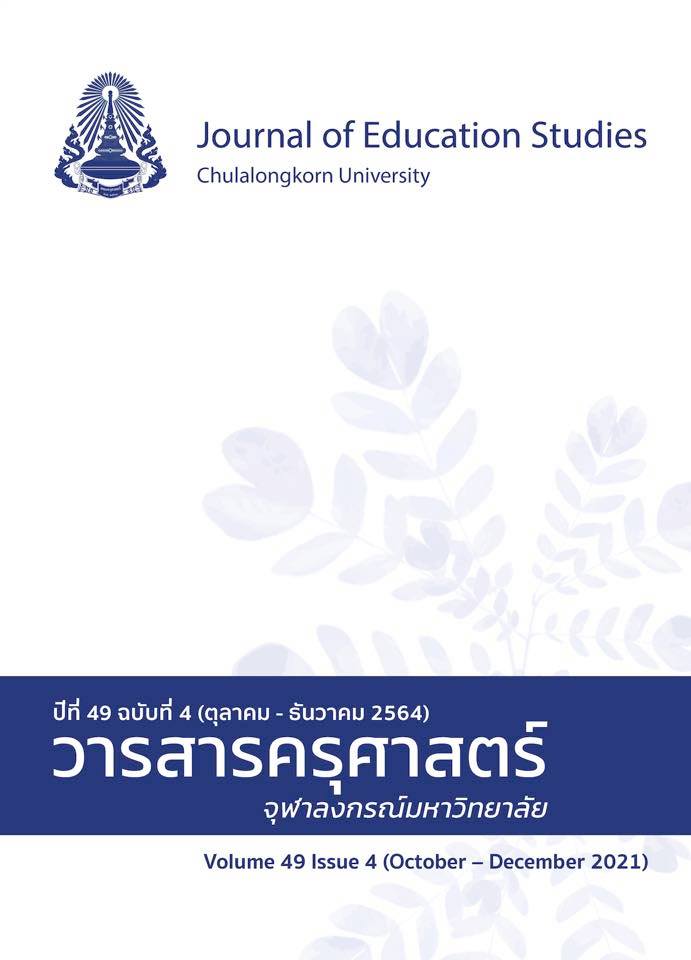The Study of Current and Desired Conditions of the Secondary School Management to Support the Enhancement of Students’ Characteristics for Societal Well-Being
DOI:
https://doi.org/10.14456/educu.2021.68Keywords:
school management, societal-wellbeing, student’s characteristicsAbstract
The objective of this research was to study the current and desired conditions of secondary school management to support the enhancement of students' characteristics for societal well-being. The participants were 684 school directors or administrative board members, and teachers from 342 secondary schools under the Office of Basic Education Commission. The research instrument was a questionnaire. Descriptive statistics consisting of frequency, percentage, average, and standard deviation, and Modified Priority Needs Index (PNImodified) were used to analyze the data. The research findings showed that the scores for current conditions of the secondary school management to support the enhancement of students' characteristics for societal well-being was at a high level (M = 3.77) and the scores for desired conditions were at the highest level (M = 4.58). In addition, general management was identified as the most priority need (PNImodified = 0.2391), and academic management was indicated as the second priority need (PNImodified = 0.2316).
References
กฤษฎาภรณ์ สิทธิปกร์. (2556). การศึกษาสภาพปัญหาความคาดหวังและแนวทางการพัฒนาการจัดการเรียนรู้ตามพระราชบัญญัติการศึกษาแห่งชาติ ฯ. สำนักงานคณะกรรมการการศึกษาขั้นพื้นฐาน. http://www.obec.go.th/node/36130
ฌาน คณาสารสมบัติ. (2556). ยุทธศาสตร์การบริหารโรงเรียนเพื่อพัฒนาคุณลักษณะที่พึงประสงค์ของผู้เรียนตามแนวคิด
ซีอาร์พี [วิทยานิพนธ์ปริญญาดุษฎีบัณฑิต ไม่ได้ตีพิมพ์]. จุฬาลงกรณ์มหาวิทยาลัย.
ถวิล มาตรเลี่ยม. (2544). การปฏิรูปการศึกษา โรงเรียนเป็นฐานการบริหารจัดการ School-based management: SBM. เสมาธรรม.
พวงชมพู ประเสริฐ. (2557). ไพบูลย์ชู 3 ยุทธศาสตร์นำคนไทยสู่สังคมอยู่ดีมีสุข. Sanook. http://www.news.sanook.com/social/4/social_47013.php
พิน ชูทอง. (2556). การพัฒนาคุณลักษณะอันพึงประสงค์ด้านจิตสาธารณะของนักเรียน ในโครงการเกษตรทฤษฎีใหม่ ตามแนวปรัชญาของเศรษฐกิจพอเพียงโรงเรียนบ้านเตง (เรือนจุลประชาสรรค์). สำนักงานคณะกรรมการการศึกษาขั้นพื้นฐาน. http://www.obec.go.th/node/36101
ภมรพรรณ์ ยุระยาตร์. (2554). การศึกษาและพัฒนาความผาสุกทางจิตใจของนิสิตนักศึกษาในมหาวิทยาลัย [วิทยานิพนธ์ปริญญาดุษฎีบัณฑิต ไม่ได้ตีพิมพ์]. มหาวิทยาลัยศรีนครินทรวิโรฒ.
ไมตรี อินทุสุต. (2559). ความคืบหน้าการเตรียมความพร้อมประเทศไทย ในการเข้าสู่ประชาคมสังคมและวัฒนธรรมอาเซียน. ASEAN-Thailand Secretariat. http://www.asccthailand.org/asccnet/images/users/admin/
ASCCFinal.pdf
ศรีประภา เหล่าโชคชัยกุล. (2552). การพัฒนาตัวบ่งชี้ความอยู่ดีมีสุขของนักเรียนมัธยมศึกษาตอนต้น : การวิเคราะห์โมเดล
สมการโครงสร้างกลุ่มพหุ [วิทยานิพนธ์ปริญญามหาบัณฑิต ไม่ได้ตีพิมพ์]. จุฬาลงกรณ์มหาวิทยาลัย.
สำนักงานคณะกรรมการการศึกษาแห่งชาติ. (2545). แผนการศึกษาแห่งชาติ (พ.ศ. 2545 – 2559). สำนักงานคณะกรรมการการศึกษาแห่งชาติ.
สำนักงานคณะกรรมการพัฒนาการเศรษฐกิจและสังคมแห่งชาติ. (2546ก). การพัฒนาที่ยั่งยืนในบริบทไทย. สำนักงานคณะกรรมการพัฒนาการเศรษฐกิจและสังคมแห่งชาติ.
สำนักงานคณะกรรมการพัฒนาการเศรษฐกิจและสังคมแห่งชาติ. (2546ข). ความอยู่ดีมีสุขของคนไทย : 5 ปีหลังวิกฤตเศรษฐกิจ (พิมพ์ครั้งที่ 2). สำนักงานคณะกรรมการพัฒนาการเศรษฐกิจและสังคมแห่งชาติ.
สำนักงานคณะกรรมการพัฒนาการเศรษฐกิจและสังคมแห่งชาติ. (2555). แผนพัฒนาเศรษฐกิจและสังคมแห่งชาติ ฉบับที่
สิบเอ็ด พ.ศ. 2555–2559. สำนักงานคณะกรรมการพัฒนาการเศรษฐกิจและสังคมแห่งชาติ.
เสาวภาคย์ แหลมเพ็ชร. (2557). ยุทธศาสตร์การบริหารกิจการนักเรียนเพื่อประสิทธิผลการพัฒนาผู้เรียนในยุคสารสนเทศ [วิทยานิพนธ์ปริญญาดุษฎีบัณฑิต ไม่ได้ตีพิมพ์]. มหาวิทยาลัยธุรกิจบัณฑิตย์.
อิทธิพัทธ์ สุวทันพรกูล. (2554). การนำเสนอกลยุทธ์ทางเลือกการบริหารจัดการสถานศึกษาเพื่อพัฒนาทักษะชีวิตของนักเรียนตามแนวคิดปรัชญาเศรษฐกิจพอเพียงและแนวคิดการจัดการศึกษาเพื่ออาชีพโดยใช้กระบวนการจัดการความรู้ [วิทยานิพนธ์ปริญญาดุษฎีบัณฑิต ไม่ได้ตีพิมพ์]. จุฬาลงกรณ์มหาวิทยาลัย.
ภาษาอังกฤษ
Ettema, D., & Schekkerman, M. (2016). How do spatial characteristics influence well-being and mental health? Comparing the effect of objective and subjective charcacteristics at different spatial scales. Travel Behaviour and Society, 5, 56-67.
Ryff, C. D. (1989). Happiness is everything, or is it? Explorations or the meaning of psychological well-being. Personality and Social Psychology, 57, 1069-1081.
Yamane, T. (1976). Statistics: An introductory analysis (3rd ed.). Harper and Row.
Zotova, O. Y., Tarasova, L. V., & Syutkina, E. N. (2016). Features of subjective well-being characteristic of
teenagers raised in two-parent families and orphanages. Procedia – Social and Behavioral Sciences, 233, 160–164.
Downloads
Published
How to Cite
Issue
Section
License

This work is licensed under a Creative Commons Attribution-NonCommercial-NoDerivatives 4.0 International License.




